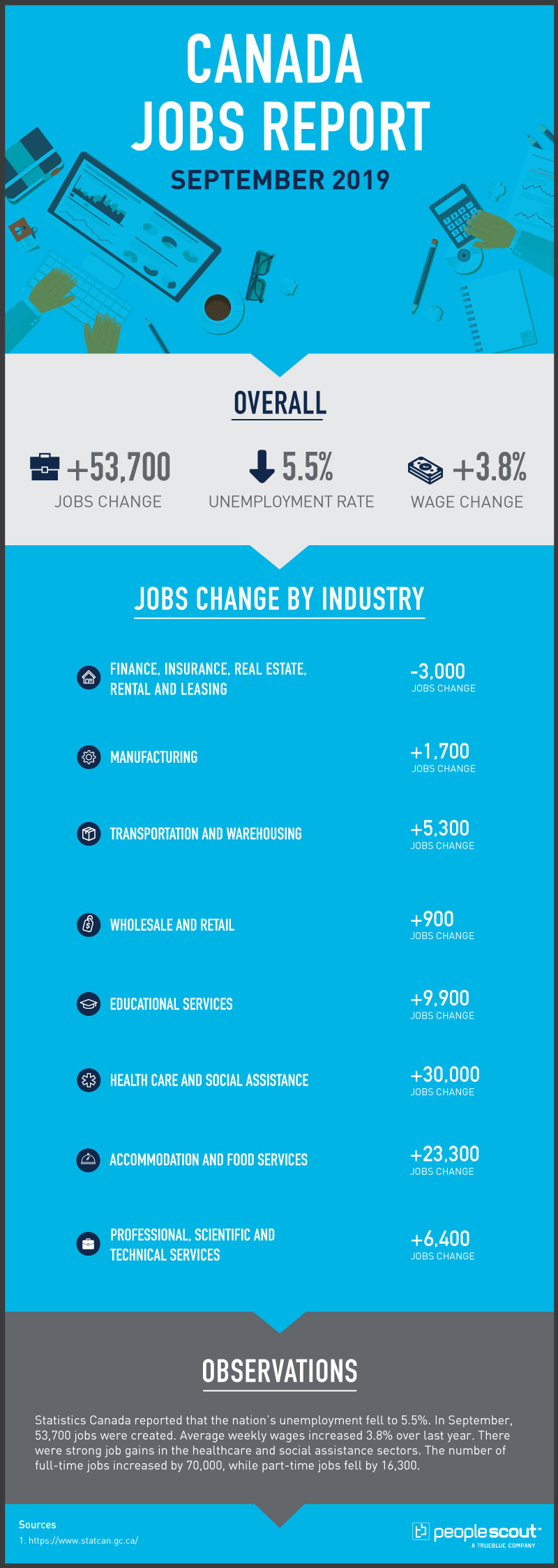Statistics Canada reported that the nation’s unemployment fell to 5.5%. In September, 53,700 jobs were created. Average weekly wages increased 3.8% over the last year. There were strong job gains in the healthcare and social assistance sectors. The number of full-time jobs increased by 70,000, while part-time jobs fell by 16,300.

The Numbers
53,700: The economy gained 53,700 jobs in September.
5.5%: The unemployment rate fell to 5.5%.
3.8%: Weekly wages increased 3.8% over the last year.
The Good
Statistics Canada reported that the addition of nearly 54,000 jobs lowered the nation’s unemployment rate to 5.5%. The job gains were due entirely to full-time work. 70,000 new full-time jobs were added, offset by a decrease of 16,300 part-time positions. In the third quarter, employment grew by 111,000, or 0.6%. On a year-over-year basis, employment grew by 456,000, or 2.4%.
The sectors with the largest increases included healthcare and social assistance, which added 30,000 jobs, and accomodations and food services, which increased by 23,300 jobs. The annual average weekly wage increase of 3.8% is well ahead of the rate of inflation, while the annual average hourly wage increase was even higher at 4.3%.
The Bad
Many of the new jobs were concentrated in Ontario, which gained 41,100 new positions, lowering the province’s unemployment rate to 5.3% With the exception of a slight increase in Nova Scotia the rest of Canada did not experience any notable job growth. 33,000 new jobs were created in the public sector, which is 61% of the total jobs added in September. This reveals a potential weak spot, at least temporarily, in the expansion of private business.
The number of self-employed workers rose by 42,000 in September, continuing an upward trend that began earlier this year. Over the last year, self-employment gains totalled 106,000 (3.7%). The growth in self-employment has two implications that can negatively impact employers and the economy as a whole. First, as more people become self-employed, there are fewer Canadians in the available talent pool for employers to hire, thereby tightening the job market. And, second, the self-employed tend to either not hire others, contract labor on an as-needed basis or employ very few people. For these reasons, the self-employed have a limited impact on job growth.
The Unknown
While much of the economic conditions in Canada appear to be strong, Canadians are growing increasingly anxious about their financial situation. An Ipsos poll conducted for Global News showed that 68% of Canadians feel like they can’t get ahead and 82% say they feel things are becoming less affordable. This poll shows Canadians are divided 50-50 on whether they are better off now than in 2015.
Factors that contribute to the anxiety of many Canadians include that fact the unemployment is still elevated in some provinces. According to Statistics Canada’s September data, in Alberta the unemployment rate stood at 6.6%, in Nova Scotia it was 7.2%, in New Brunswick 8.3% and in Prince Edward Island it was 8.8%.
While wages are increasing, costs of some services essential to millions of Canadians, such as childcare, are increasing faster than the rate of inflation. Canadian employers have no clear way to forecast how their employees will act on their feelings of economic uncertainty. Will some quit to find new work at higher wages? Will others be more likely to remain due to their desire for security and stability? Effective employee engagement and strong communication at every level in an organization are critical components to effectively manage, and retain, valuable talent during this time of perceived economic instability.


![[On-Demand] AI in Recruiting: Hype, Ethics & Best Practices](https://www.peoplescout.com/wp-content/uploads/2024/03/ai-webinar-1-320x320.jpg)
